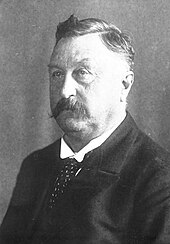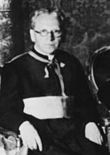Centre Party (Germany)
The party name Zentrum (Centre) originally came from the fact that Catholic representatives would take up the middle section of seats in parliament between the social democrats and the conservatives.In 1858, when the "New Era" governments of Wilhelm I adopted more lenient policies, the club renamed itself "Fraction of the Centre" in order to open itself up to include non-Catholics.Growing anti-Catholic sentiment and policies, including plans for dissolving all monasteries in Prussia, made it clear that a reorganisation of the group was urgently needed in order to protect Catholic minority rights, enshrined in the 1850 constitution, and to bring them over to the emerging nation state.The party not only defended the Church's liberties, but also supported representative government and minority rights in general, in particular those of German Poles, Alsatians, and Hannoverians.He called upon Catholic politicians to fulfill Windthorst's word and get out of their perpetual minority position by an effort to increase Protestant numbers among their representatives in parliament.The same year, the Centre's Georg von Hertling, formerly Minister-President of Bavaria, was appointed Chancellor, but he could not overcome the dominance of the military leadership of Hindenburg and Ludendorff.When a parliamentary system of government was introduced in October 1918, the new chancellor Max von Baden appointed representatives from the Centre party, the Social Democrats and the left-liberals as ministers.[12] The party was an ideologically diverse coalition of Catholic politicians, comprising republicans like Matthias Erzberger and Joseph Wirth as well as right-wingers like Franz von Papen.The Centre had a share of the odium attached to the so-called "Weimar Establishment" which was blamed, especially on the right, for the German defeat in World War I in the Stab-in-the-back myth, as well as for the humiliations of the Versailles Treaty and reparations.In the second round, combining the support of the Weimar coalition parties, he gained 45.3% of the vote and finished a close second to the victorious right-wing candidate Paul von Hindenburg with 48.3%.To mediate the tension between the wings and to strengthen their ties with the Bishops, the party in September 1928 did not elect the two favourites Joseph Joos and Adam Stegerwald, but rather the cleric Ludwig Kaas as chairman.Brüning was confronted with economic crises exacerbated by the Great Depression and had to tackle the difficult tasks of consolidating both budget and currency when faced with rising unemployment, and of also negotiating changes to the war reparations payments.His course of strict budget discipline, with severe cuts in public expenditure, and tax increases made him extremely unpopular among the lower and middle classes as well as among the Prussian Junkers.[15] The Centre consistently supported Brüning's government and in 1932 vigorously campaigned for the re-election of Paul von Hindenburg, calling him a "venerate historical personality" and "the keeper of the constitution".An alternative majority could be not found and the Papen administration had seized this opportunity to assume control of Germany's largest state in the "Prussian coup" via presidential decree.The Centre advocated a return to Brüning's "authoritarian democracy", which they considered up to the times and tested by experience, against Papen's "omnipotent state and independent leadership", while the Nazis would only accept a coalition that would serve their purpose of achieving total dominance.Catholic journalists Fritz Gerlich and Ingbert Naab dismissed as "illusionary" the attempt to "uphold the constitution and the legal order" with a man such as Hitler with his "unconditional propensity to evil".Though Papen did not expect the negotiations to succeed, he was nonetheless concerned as a success would have led to a presidential crisis, as Hindenburg was unwilling to have a coalition parties dictate the administration.Since the cabinet had refused to support Papen's planned coup d'état by a permanent dissolution of the Reichstag, in December Hindenburg appointed General Kurt von Schleicher as Chancellor.The party was now faced with two alternatives – either to persist in protesting and risk reprisals like Communists and Social Democrats, or to declare their loyal cooperation, in order to protect their members.These mainly included respecting the President's Office retaining veto power, religious liberty, its involvement in culture, schools and education, the concordats signed by German states and the existence of the Centre Party.Via Papen, Hitler responded positively and personally addressed the issues in his Reichstag speech but he repeatedly put off signing a written letter of agreement."[21] According to English historian Richard J. Evans, the main reason why the Centre Party voted for the Enabling Act despite questioning the sincerity of Hitler's guarantees was because of the intimidation that it was subjected to.(...) Not surprisingly, it was fear of the complete destruction of its lay organisations and the reversal of all the progress that Catholic laymen had made towards gaining equality of status with Protestants that provided the major impetus behind the agreement of the Centre to dissolve itself in return for a Concordat in which the new regime would commit itself – with how little sincerity would soon become apparent – to preserving the integrity of the Catholic community and its institutions.A considerable number of parliamentarians opposed the chairman's course, among these former Chancellors Heinrich Brüning, Joseph Wirth and former minister Adam Stegerwald.Brüning called the Act the "most monstrous resolution ever demanded of a parliament" and was sceptical about Kaas's efforts: "The party has difficult years ahead, no matter how it would decide.SA men served as guards and crowded outside the building to intimidate any opposition while the Communist and some Social Democratic members of the Reichstag had been imprisoned and were thus prevented from voting.In 1951, she vocally opposed Adenauer's policy of West German rearmament and joined forces with the CDU's Gustav Heinemann, the former Minister of the Interior.The two formed the Notgemeinschaft zur Rettung des Friedens in Europa ("Emergency Community to Save the Peace in Europe"), an initiative intended to prevent rearmament.The party adopted a new program in 2008 in which it stated rejection for the traditional left and right divide of politics and called for a "value-oriented" platform guided by the principles of Christianity and Basic Law for the Federal Republic of Germany.It also calls for strong law and order and national security policies to combat violent crime and terrorism and supports German membership of NATO.














Christian OtteJoseph GörresDormagenYouth wingReichsbanner Schwarz-Rot-GoldIdeologyChristian democracyPolitical CatholicismPolitical positionCentre-rightCatholic ChurchBundestagBundesratState parliamentsEuropean ParliamentPolitics of GermanyPolitical partiesElectionsCatholic social teachingChristian corporatismChristian ethicsCommunitarianismConservatismLiberalProgressiveSocialConsistent life ethicCultural mandateCulture of lifeDignity of laborDistributismEconomic progressivismFamilialismHuman dignityJust war theoryLiberalismConservativeMixed economyMulticulturalismNeo-CalvinismNeo-ThomismOption for the poorPerson Dignity TheoryPopularismPublic moralityReligious libertyReligious pluralismSocial GospelSocial justiceSocial market economySolidaritySphere sovereigntyStewardshipEnvironmentalismEnvironmental protectionSubsidiarityin CatholicismWelfareArizmendiarrietaBaaderBellocBerggravChestertonDooyeweerdGebhardtGilsonGörresHabsburgJohn Paul IIKettelerKorfantyLamennaisLeo XIIIMaritainMounierNell-BreuningOzanamPius XIRöpkeSturzoTischnerVogelsangWilliamsAdenauerAndreottiCalderaCleridesCosgraveDe GasperiErhardFenech AdamiJosephKuyperLipinskiLubbersMartensMazowieckiMerkelMetsolaMikołajczykQuadrosPastranaPethrusPötteringSchäfferSchumanSöderStegerwaldStraussTindemansvon der LeyenWałęsaWernerWindthorstAmerican Solidarity PartyAustrian People's PartyChristian Democratic AppealChristian Democratic and FlemishChristian Democratic PartyChristian Democratic People's PartyChristian Democratic Union of GermanyChristian Social People's PartyChristian Social Union in BavariaCivic PlatformCroatian Democratic UnionDemocratic Rally
